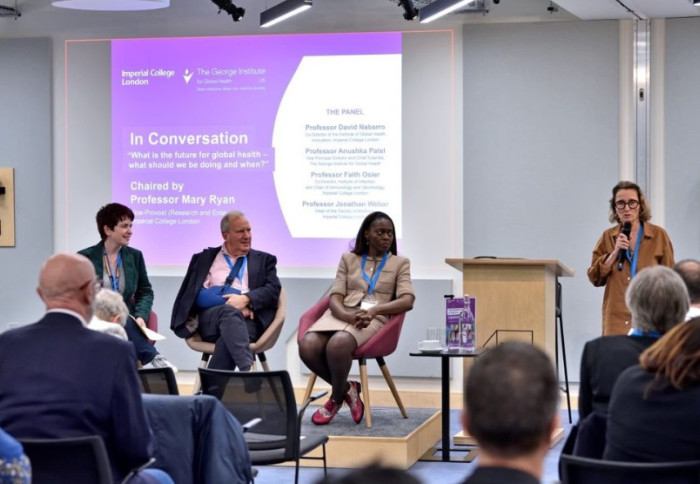Equity, collaboration, and knowledge key in delivering global health impact
by Jack Stewart

The George Institute for Global Health and Imperial College London marked their partnership with an event in November 2022.
The event focused on how sharing knowledge and strengthening collaborations can deliver greater impact in improving people’s health and providing solutions to those who most need it.
Understanding the world and making a difference
Equity, collaboration, and knowledge emerged as touchstones of the day. In his opening remarks, Provost Professor Ian Walmsley noted Imperial’s drive to understand the world through new discoveries, while seeking to make a difference to the world through applying such understanding.
As he was joined by Professor Robyn Norton (Principal Director, The George Institute), Ian noted the ideal nature of the partnership given the shared objectives of having an impact around the world and a focus on reducing non-communicable diseases (NCDs) and injuries across all nations.
Proceedings continued with a keynote from Professor Charlotte Watts (Chief Scientific Adviser and Director for Research and Evidence, Foreign, Commonwealth and Development Office, UK Government) reflecting on global health priorities in a challenging world, and how to address health inequities that are driven by transnational forces.
Charlotte described how the past two decades have seen significant progress in health and development, and how the next two will present multiple, evolving and interacting challenges to human health and health systems. COVID-19 has already shown the global connectedness of health threats while climate change will undoubtedly pose a greater risk than COVID-19. She underscored the role of knowledge in addressing these threats, specifically noting research (generating context-relevant evidence to help inform decision-making) and new innovations.
Focus on planetary health and health systems
From this scene-setter, attendees heard from experts in two thematic research sessions. The first covered planetary health and health systems and was chaired by Professor Chris Millett (Professor of Public Health, Imperial). Chris was joined by a panel comprising:
- Professor Vivekanand Jha (Executive Director, The George Institute for Global Health, India and Chair of Global Kidney Health, School of Public Health, Imperial)
- Dr Kristine Belesova (Senior Lecturer in Global Population Health, School of Public Health, Imperial)
- Dr Stephanie Wright (Lecturer in Environmental Toxicology, School of Public Health, Imperial)
- Allie Gaines (PhD candidate, School of Public Health, Imperial).
Much of the session focused on the plans and anticipated impact of the recently announced NIHR Global Research Centre for Non-Communicable Diseases and Environmental Change, led by Imperial College London and The George Institute, India. This Centre will work to tackle the intersection between environmental change and NCDs by generating high-quality evidence for action, improving wellbeing and health equity, focusing on vulnerable population groups, strengthening research capacity, and meaningfully engaging with key communities.
Focus on women’s health and multimorbidity
The second thematic session focussed on women’s health and multimorbidity and was chaired by Professor Marisa Miraldo (Professor in Health Economics and Public Policy, Imperial College Business School) with a panel comprising:
- Dr Carinna Hockham (Postdoctoral Research Associate, The George Institute for Global Health, School of Public Health, Imperial)
- Professor Dame Lesley Regan (Women’s Health Ambassador, UK Government and Professor of Obstetrics and Gynaecology, Imperial College NHS Trust)
- Professor Ioanna Tzoulaki (Professor of Chronic Disease Epidemiology, School of Public Health, Imperial)
- Professor David Peiris (Director of the Global Primary Health Program and Co-Director of the Centre for Health Systems Science, The George Institute for Global Health).
Presenters picked up on some of the global temporal trends cited earlier in the day (for instance global population ageing and increasing life expectancy) to discuss ongoing collaborative work around multimorbidity (the co-occurrence of two or more long-term conditions) and plans for a network of excellence on women’s health.
Outlining and delivering global health impact
Professor Otavio Berwanger, the newly appointed Executive Director for The George Institute, UK and Chair in Public Health at Imperial then offered an inspiring keynote. Otavio quoted Sir Muir Gray with ‘knowledge is the enemy of disease’ and outlined his vision for the partnership with its focus on health systems science, multimorbidity, women’s health, large-scale clinical trials and planetary health.
The final, much-anticipated session was a panel discussion considering ‘What is the future for global health – what should we be doing and when?', chaired by Professor Mary Ryan (Vice-Provost, Research and Enterprise, Imperial College London) and panellists:
- Professor David Nabarro (Co-Director, Institute of Global Health Innovation, Imperial)
- Professor Anushka Patel (Vice Principal Director and Chief Scientist, The George Institute)
- Professor Faith Osier (Co-Director, Institute of Infection, and Chair of Immunology and Vaccinology, Imperial)
- Professor Jonathan Weber (Dean, Faculty of Medicine, Imperial).
Critical approaches that were discussed included refreshing thinking about partnerships, working to ensure a focus on capacity-strengthening, knowledge-sharing and access, and reflection on the importance of heterogeneity of partners. To be effective, partnerships require sustained commitment, trust, and championing of agency.
Anushka focused on priorities: “When we speak, when we act, when we research on health security, on biosecurity, on pandemic preparedness (the red hot global health topics of the day) we have to include a deep consideration of NCDs and their determinants”, a comment echoed by David.
Ultimately, people, particularly the emerging generation, are key to global health impact as they work in partnership to realise it for themselves, their global peers and to sustain it for the future.
Article text (excluding photos or graphics) © Imperial College London.
Photos and graphics subject to third party copyright used with permission or © Imperial College London.
Reporter
Jack Stewart
School of Public Health